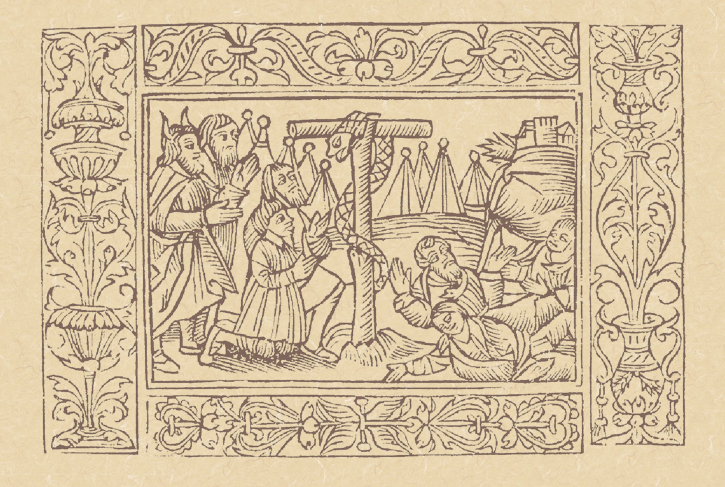What Is the Point of Being Saved if There's Nothing to Be Saved From?
The Fifth Tuesday of Lent.
Lessons from the feria, according to the ordinary form of the Roman Rite:
• Numbers 21: 4-9.
• Psalm 102: 2-3, 16-21.
• John 8: 21-30.
Passion Tuesday; and, the Commemoration of the Archangel Gabriel.
Lessons from the feria, according to the extraordinary form of the Roman Rite:
• Daniel 14: 27-42.
• Psalm 42: 1, 3.
• John 7: 1-13.
The Fifth Tuesday of the Great Fast; a Prefestive Day of the Annunication;* the Feast of Our Venerable Father Zachary; and, the Feast of Our Holy Father Artemon, Bishop of Seleucia of Pisidia.
Lesson from the triodion, according the the typicon of the Byzantine-Ruthenian Rite:
[There is no Divine Liturgy; but, at the Sixth Hour...]
• Isaiah 49: 6-10.
FatherVenditti.com
|
 9:37 AM 3/24/2015 — Two Sunday's ago we read that Gospel lesson from Saint John in which our Lord told Nicodemus that, just “as Moses lifted up the serpent in the wilderness, so must the Son of man be lifted up, that whoever believes in him may have eternal life” (John 3: 14-15 RSV); and, in today's Old Testament lesson we are given to read that very passage from the Book of Numbers to which our Lord is referring. We know, of course, from our perspective, that the lifting up of the snake by Moses was an archetype of our Lord being lifted up on the Cross, with our Lord's dialog with Nicodemus being a prediction of His Passion; but, in reading this lesson from Numbers today, we find an element that so often escapes us. 9:37 AM 3/24/2015 — Two Sunday's ago we read that Gospel lesson from Saint John in which our Lord told Nicodemus that, just “as Moses lifted up the serpent in the wilderness, so must the Son of man be lifted up, that whoever believes in him may have eternal life” (John 3: 14-15 RSV); and, in today's Old Testament lesson we are given to read that very passage from the Book of Numbers to which our Lord is referring. We know, of course, from our perspective, that the lifting up of the snake by Moses was an archetype of our Lord being lifted up on the Cross, with our Lord's dialog with Nicodemus being a prediction of His Passion; but, in reading this lesson from Numbers today, we find an element that so often escapes us.
The wanderings of the Israelites in the desert can be—and should be—seen as a prefiguring of Lent: having released them from bondage in Exodus, God allows them to wander in the desert for forty years as a purification in preparation for establishing them as a great kingdom, in much the same way that Christ, having redeemed us from our sins, suffers us to be purified every year during this Holy Season in preparation for celebrating the true redemption that occurred with his resurrection from the dead, and which will be ratified for the faithful when he comes again in His glory. As chapter twenty-one of Numbers begins, just before the first verses of our first lesson, God grants His people a tremendous victory over the Canaanites; and, right on the heals of this, almost as if it never happened, everyone is complaining: there's not enough food, there's not enough water, “Why didst thou ever bring us away from Egypt, only to die in the desert?” (21: 5 Knox), almost as if God had done nothing for them.
And is that not, so often, the story of our own spiritual journey? We receive so much from God; yet, the moment some hardship, some suffering, some trial comes our way, the first words that fall from our lips in our prayer is “O God, woe is me!” as if our life is nothing but one big penance. And this is where what happens in the Book of Numbers is crucial: “In punishment the Lord sent among the people saraph serpents, which bit the people so that many of them died” (21: 6 NABRE). The snakes were sent by God. Now, He also told Moses what he had to do to save the people, but He was saving them from His own punishment. He punished them to purify them; once they were purified, He saved them.
God, in His permissive will, allows us to suffer many things, and we react to that often in a very infantile way: we think it's unfair; we think it's unjust; we think we deserve better because we've lived a good life; we blame God, basically, for not making sense in His treatment of us, or what we perceive is His treatment of us.
When I was in the seminary in New York, we were privileged to receive a visit from Mother Teresa;—now blessed Teresa—and, as I listened to her speak, I remember having the impression that here was someone who was so obviously convinced that God had saved her from something. What it was she thought God had saved her from we'll never know, but she did say something in her very brief talk to us that resonated: she said, “What is the point of being saved if there's nothing to be saved from?”
Expecta Dominum, viriliter age: et confortetur cor tuum, et sustine Dominum. The words of today's Entrance Antiphon, from Psalm 27: “Wait patiently for the Lord to help thee; be brave, and let thy heart take comfort; wait patiently for the Lord” (v. 14 Knox).

* In the Byzantine Tradition, major feasts are preceded by prefestive days, marked by certain chants and prayers related to the feast added to the day's services. The number of prefestive days is determined by the importance of the feast and/or any celebrations that might conflict with them. The same holds true for post-festive days.
|

